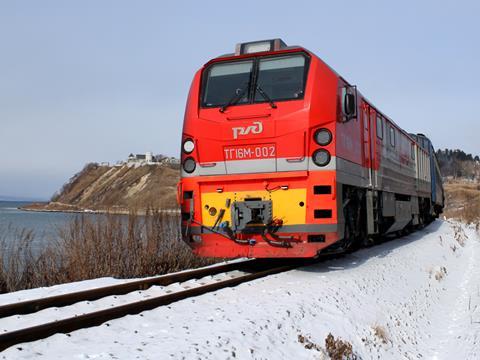
RUSSIA: Two multilateral agreements have been signed to explore the potential for autonomous operation of hydrogen-powered trains in Sakhalin oblast.
A memorandum of understanding was signed at the Eastern Economic Forum in Vladivostok on September 2-4 between the government of Sakhalin, finance house Sberbank and Cognitive Pilot, a specialist in AI-based self-driving technologies for rail and agricultural machinery applications.
The partners will work with the Sakhalinskaya Railway subsidiary of Russian Railways, which operates the network on the island off Russia’s east coast, to equip locomotives with Cognitive Rail Pilot. This is an autonomous locomotive driver assistance system which has been tested at various locations on the RZD network in 2020-21.
The three parties are to work together ‘to resolve legislative and regulatory conditions’ for the use of AI in rail transport through a regulatory sandbox approach.
The agreement also calls for Cognitive Pilot to establish an R&D centre in Sakhalin to explore the specific challenges of automation in a harsh climate. This centre will work with Sakhalin State University to ‘enable the involvement of young professionals in the sphere of AI’.
Hydrogen plan
A further MoU was signed on September 3 by the Governor of Sakhalin Valery Limarenko; Russian Railways CEO Oleg Belozerov; Kirill Lipa, Chief Executive of rolling stock manufacturer Transmashholding; and Kirill Komarov, First Deputy CEO of energy company Rosatom, under which a fleet of seven hydrogen fuel cell trainsets is to be built for Sakhalinskaya Railway.
A low-carbon hydrogen production facility is to be established on the island along with a network of refuelling points, while SSU is to develop bespoke engineering courses aimed at training railway staff to work with hydrogen traction. This should to facilitate the launch of a hydrogen powered local passenger service, the MoU said.
Cognitive Pilot said that it expects the hydrogen multiple-units to be fitted with Rail Pilot as they enter service.
‘Implementation of these breakthrough domestic AI solutions in the most important areas of the Sakhalin economy will increase the efficiency of production, help reduce the carbon footprint, and save financial and human resources’, said Limarenko.
‘The parties will develop a testing facility on the island for modern AI-based technology tests in the field of autonomous transport. All the points of the agreement will be fulfilled by 2030’, added Olga Uskova, CEO of Cognitive Pilot.
‘Hydrogen trains are not a science fiction anymore, but rather our near future’, insisted Belozerov. ‘They will eventually allow us to reduce harmful emissions to zero. Our experience shows that in-demand innovations can be implemented rather quickly.’

















